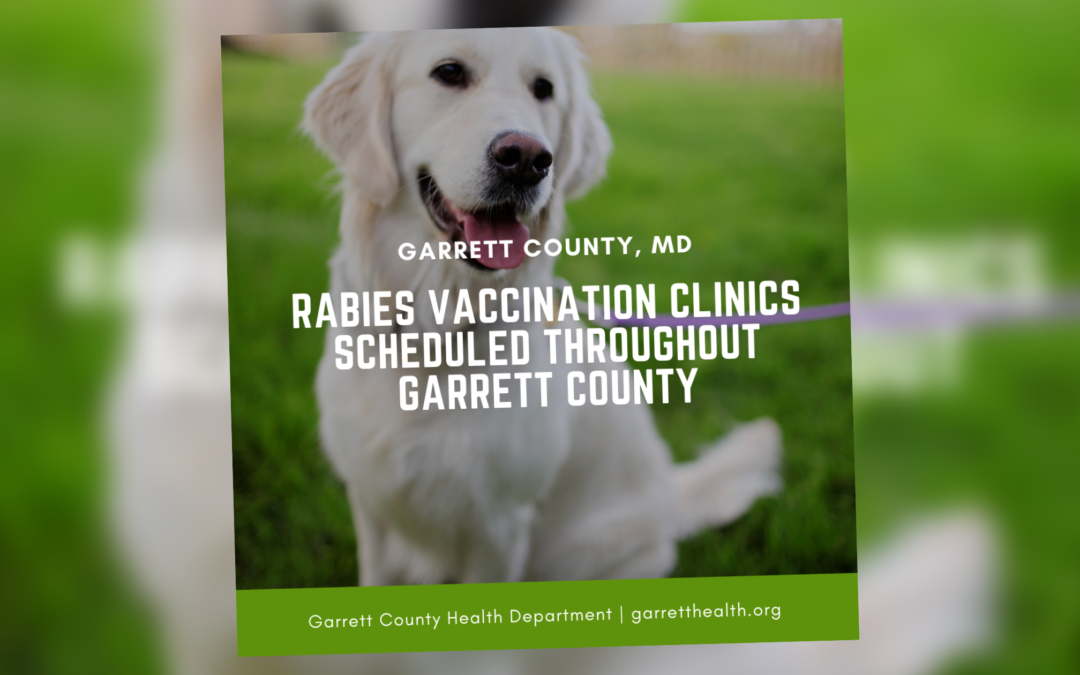By Diane Lee, Public Information Officer, Garrett County Health Department
The Garrett County Health Department’s Environmental Health Office has announced this spring’s low-cost rabies clinics for the vaccination of dogs, cats, and ferrets at six locations.
“Garrett County experienced four cases of laboratory confirmed rabies last year,” said Bryce Manges, Environmental Health Specialist. “Protect your pets and your family from the threat of this virus by bringing your dogs, cats, and ferrets to the clinic in your area.”
The schedule is as follows:
• Grantsville Fire Department, Monday, May 10, 5-6 p.m.
• Gorman Fire Department, Tuesday, May 11, 5-6 p.m.
• Friendsville Fire Department, Wednesday, May 12, 5-6 p.m.
• Accident MEDCO Building, Thursday, May 13, 5-6 p.m.
• Swanton Community Center, Friday, May 14, 5-6 p.m.
• Oakland, Garrett County Health Department, Saturday, May 15, 10 a.m. – Noon
To help prevent the spread of COVID-19, the following protocols will be required in order to have your animal(s) vaccinated. All persons must wear a face covering or face shield. All individuals in line must consistently maintain at least six feet of distance from individuals who are not members of their household.
The cost of the vaccination is $5 per animal at the clinics. Dogs must be on a leash and under the control of a responsible individual. Cats and ferrets must be brought to the clinic in a cage or a tightly secured box with air holes. If a cage or carrier is not available, the cat must be carried in a pillowcase or suitable cloth sack. Close contact of animals at the clinics increases the risk of bites or scratches. Please be prepared to restrain and control your animals in order to avoid a potential incident.
The Centers for Control of Disease and Prevention (CDC) describes rabies as a preventable viral disease of mammals that is transmitted through the bite of a rabid animal. The rabies virus infects the central nervous system, ultimately causing disease in the brain and leading to death. Rabies in both humans and pets is preventable by following proper procedures and guidelines.
“Garrett County is very fortunate to have many forms of wildlife,” said Bob Stephens, Garrett County Health Officer. “But, wild mammals – bats, foxes, squirrels, coyotes, skunks and raccoons are the main carriers of rabies. Parents should teach their kids not to play with or touch wild animals and even unfamiliar cats and dogs. While these animals may look friendly, they could also carry the rabies virus which untreated could be fatal. People bitten by these animals should seek prompt medical care. Also, please report stray dogs and cats to Garrett County Animal Control.”
Many species of animals are more active this time of year, increasing the likelihood of crossing paths with people – especially children. Raccoons are the most frequently identified carrier of rabies in Maryland. Since they are normally active only at night, any raccoon seen wandering around in the daytime is highly suspicious for rabies.
A cat with rabies serves as a reminder that the disease is not associated only with wild animals. Rabid cats are a special concern, as they are the number one domestic animal species most likely to be unvaccinated and have frequent contact with humans. Last year, cats were the second most common species that tested positive for rabies in Maryland.
“Feral and stray cats tend to be common in the agricultural community in Garrett County,” Manges added. “Farm owners need to be vigilant of feral or unfamiliar cats residing in and around buildings. Attempts should be made to control these feral cat populations by having them removed or vaccinated against rabies.”
Maryland law requires dogs, cats and ferrets over four months of age to be vaccinated against rabies, however, they may be adequately vaccinated at three months of age. Dogs and cats need to be revaccinated every three years. Puppies and kittens vaccinated between the ages of three and twelve months, and dogs and cats receiving their first vaccination, must be revaccinated 12 months later. Ferrets need to be revaccinated every year.
County dog and cat licenses will be available at each clinic. License cost is $3 per year for a spayed/neutered animal and $15 for non-spayed/neutered.
“The vaccination of dogs and cats is one of the most critical measures that can be taken by pet owners in protecting their families and themselves from possible exposure to the rabies virus,” Manges said. “Since wildlife rabies continues to be in Garrett County, all pet owners are strongly urged to bring their pets to one of the clinics.”
For more information about rabies or these clinics, call Environmental Health at 301-334-7760.
- Weather-Related Cancelation – Bounce Into Summer Event - June 8, 2025
- 360 Access Hub (Also Known as the Garrett County Food Bank Project) Takes Another Step Forward With Help From Community Works Garrett County! - June 6, 2025
- Garrett County Enhances Stakeholder Access to Advanced Mapping Tools and Public Property Records Through a Strategic Collaboration Between the Health Department and Garrett County Government - June 6, 2025









